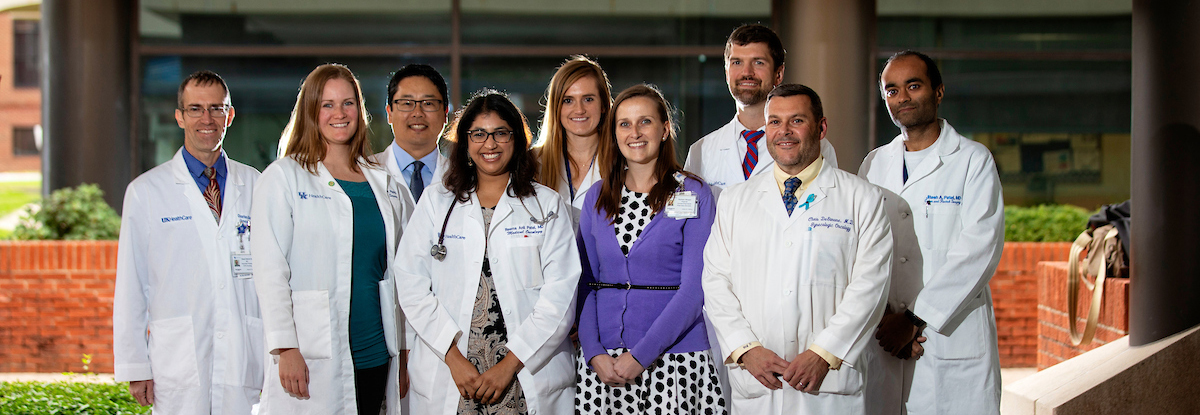Hyperthermic Intraperitoneal Chemotherapy (HIPEC)
The UK Markey Cancer Center now offers hyperthermic intraperitoneal chemotherapy (HIPEC), a heated chemotherapy treatment, also known as a chemotherapy bath, delivered directly to the abdomen during surgery. Our multidisciplinary team typically uses HIPEC to treat patients with colorectal cancer, ovarian cancer, appendix cancer, small intestinal cancer, stomach cancer, and primary peritoneal cancer.
Make an appointment online or call 859-257-1000 or 800-333-8874 to schedule.
How it works
Before receiving HIPEC treatment, your doctor will remove visible tumors in the abdominal area with cytoreductive surgery (CRS). Once these tumors have been removed, a HIPEC treatment will be delivered to the abdomen to destroy any cancer cells that are not visible to the eye. This procedure typically takes between 30 and 90 minutes to complete, followed by removal of the chemotherapy and closing the incision.

Side effects of heated chemotherapy
The HIPEC procedure advances chemotherapy treatment but without the side effects that are common to intravenous chemotherapy. Since heated chemotherapy drugs stay within the abdomen, the approach minimizes exposure to chemotherapy to the rest of the body. By limiting the exposure, doctors can safely treat patients with higher doses of chemotherapy.
HIPEC treatment does not produce the common side effects of traditional chemotherapy such as hair loss and nausea. Applying the heat therapies directly to the abdominal area allows HIPEC treatment to avoid the downsides of traditional chemotherapy.
Recovery after treatment
In most cases, our patients have a hospital length of stay of approximately 7-10 days. In some cases, the hospitalization could be shorter or possibly longer.
Following the procedure, our goal is to get our patients back to their normal routines as soon as possible. After you return home from your stay in the hospital, you will be able to eat regular food and participate in routine minor activities. It is important that you stay active within your limits and maintain good nutrition.
Frequently Asked Questions (FAQ)

Our multidisciplinary team, which consists of GYN, colorectal, surgical, medical and pharmaceutical oncology focuses, is here to answer your questions and help you feel at ease.
Learn more about HIPEC below with a Q&A from UK HealthCare Chief of Surgical Oncology Joseph Kim, MD, an international leader in the treatment.
Q: What is CRS?
A: Cytoreductive surgery, commonly referred to as CRS, is the removal of all sites of cancer within the abdominal cavity. This surgery is performed prior to receiving the HIPEC chemotherapy treatment.
Q: How is CRS different from regular surgery for abdominal cancer?
A: CRS is quite different from standard operations for abdominal cancer. In most instances, patients with peritoneal carcinomatosis, a disease that has spread in the peritoneal cavity, are not offered operations since these patients are considered to have unresectable disease, meaning their cancer cannot be removed with surgery.
However, CRS can be very effective when performed on carefully selected patients with peritoneal carcinomatosis. The goal of an operating surgeon is to remove all visible cancer in the abdominal cavity. Since most surgeons have limited surgical experience with peritoneal carcinomatosis, it is very important to find surgeons with years of experience in this setting.
Q: What types of cancer is HIPEC used to treat?
A: Our team typically uses HIPEC to treat patients with colorectal cancer, ovarian cancer, appendix cancer, small intestinal cancer, stomach cancer, and primary peritoneal cancer.
Q: Why is HIPEC preferred over traditional chemotherapy?
A: Traditional chemotherapy is given through the intravenous route to reach the cancer targets. HIPEC allows direct contact between the chemotherapy drugs and microscopic cells that remain in the peritoneal cavity. This minimizes the rest of the body’s exposure to the chemotherapy while allowing doctors to safely increase the chemotherapy dose in targeted areas.
Q: Is HIPEC experimental? Does health insurance cover it?
A: HIPEC is not experimental and studies have verified that it is an effective and safe procedure in experienced medical centers. This treatment is covered by insurance, and our team has experience with helping both in-state and out-of-state patients obtain insurance coverage.
Q: What is the advantage of having this procedure done at UK HealthCare?
A: At UK HealthCare, our multidisciplinary team (surgery, radiology, pathology, medical oncology, social work) has decades of combined experience in providing CRS and HIPEC for patients. For every procedure, we carefully consider the best route to getting our patients back to their normal routine as soon as possible.



